Case Study: The Impact of Taxation Reforms in Australia
VerifiedAdded on 2023/06/03
|9
|1966
|220
Case Study
AI Summary
This case study analyzes the proposed taxation reforms in Australia, specifically focusing on measures to address the black economy. It outlines the reform proposal, discusses its theoretical and empirical rationale, and evaluates its likely impact on aggregate output, income, unemployment, poverty, and the environment. The analysis highlights the negative consequences of the black economy, including income inequalities, corruption, and environmental degradation, while also examining the potential benefits of the proposed reforms in terms of increased revenue collection and improved social and economic outcomes. The study recommends equipping tax enforcement agencies, eliminating unfair advantages, improving the ABN system, limiting cash transactions, and creating multi-agency approaches and task forces to combat illicit activities. Overall, the case study concludes that while the reforms may not entirely solve the problem, they represent a promising start towards a fairer and more equitable taxation system in Australia.
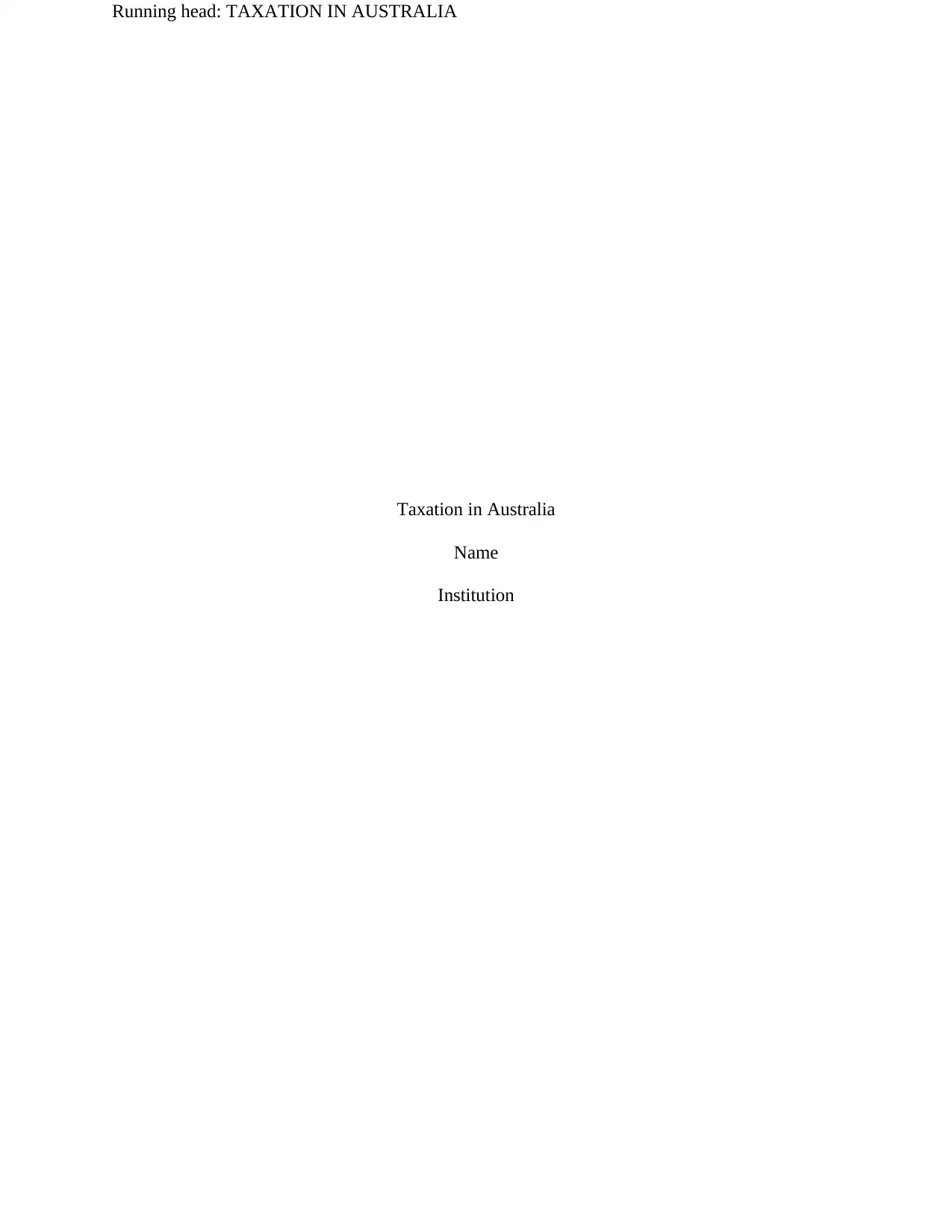
Running head: TAXATION IN AUSTRALIA
Taxation in Australia
Name
Institution
Taxation in Australia
Name
Institution
Paraphrase This Document
Need a fresh take? Get an instant paraphrase of this document with our AI Paraphraser
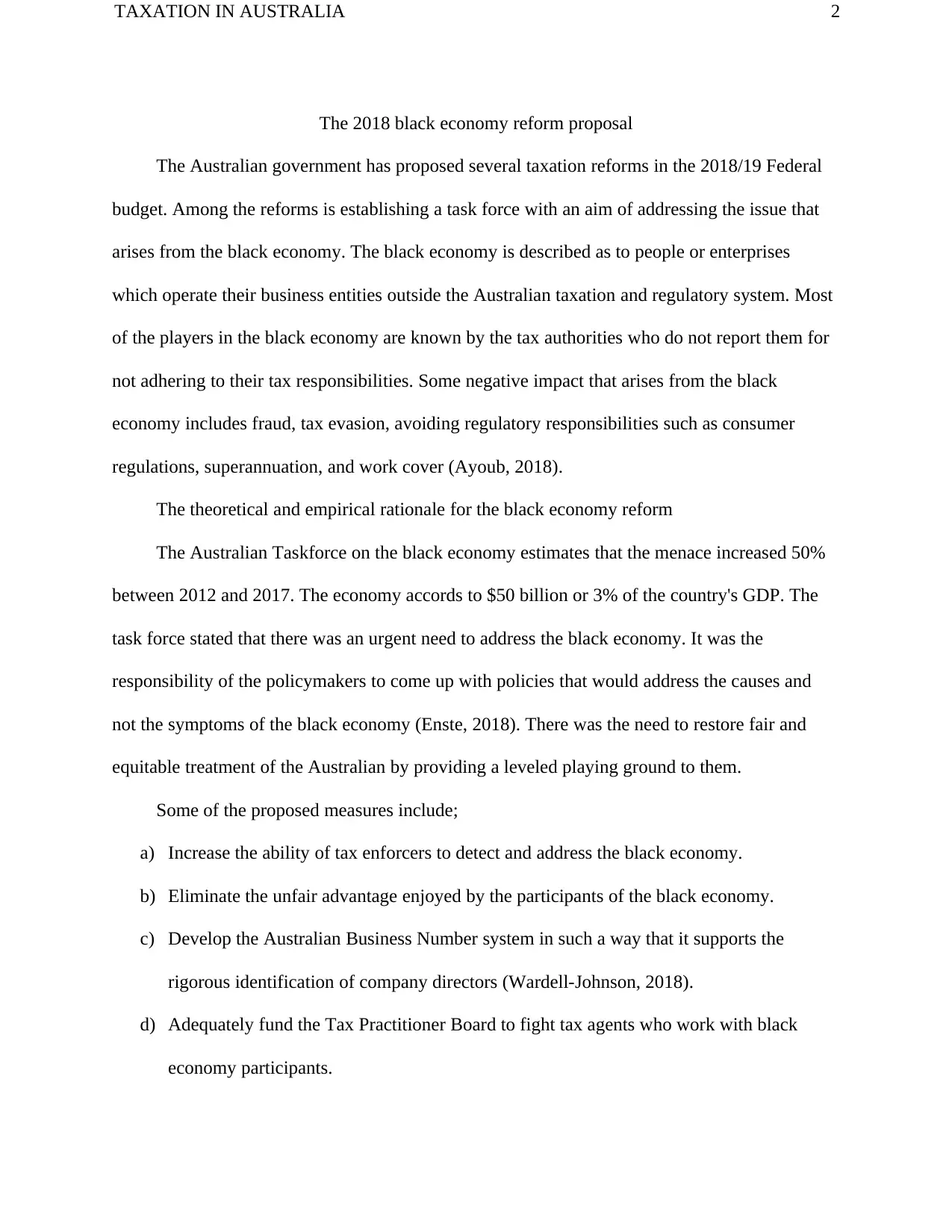
TAXATION IN AUSTRALIA 2
The 2018 black economy reform proposal
The Australian government has proposed several taxation reforms in the 2018/19 Federal
budget. Among the reforms is establishing a task force with an aim of addressing the issue that
arises from the black economy. The black economy is described as to people or enterprises
which operate their business entities outside the Australian taxation and regulatory system. Most
of the players in the black economy are known by the tax authorities who do not report them for
not adhering to their tax responsibilities. Some negative impact that arises from the black
economy includes fraud, tax evasion, avoiding regulatory responsibilities such as consumer
regulations, superannuation, and work cover (Ayoub, 2018).
The theoretical and empirical rationale for the black economy reform
The Australian Taskforce on the black economy estimates that the menace increased 50%
between 2012 and 2017. The economy accords to $50 billion or 3% of the country's GDP. The
task force stated that there was an urgent need to address the black economy. It was the
responsibility of the policymakers to come up with policies that would address the causes and
not the symptoms of the black economy (Enste, 2018). There was the need to restore fair and
equitable treatment of the Australian by providing a leveled playing ground to them.
Some of the proposed measures include;
a) Increase the ability of tax enforcers to detect and address the black economy.
b) Eliminate the unfair advantage enjoyed by the participants of the black economy.
c) Develop the Australian Business Number system in such a way that it supports the
rigorous identification of company directors (Wardell-Johnson, 2018).
d) Adequately fund the Tax Practitioner Board to fight tax agents who work with black
economy participants.
The 2018 black economy reform proposal
The Australian government has proposed several taxation reforms in the 2018/19 Federal
budget. Among the reforms is establishing a task force with an aim of addressing the issue that
arises from the black economy. The black economy is described as to people or enterprises
which operate their business entities outside the Australian taxation and regulatory system. Most
of the players in the black economy are known by the tax authorities who do not report them for
not adhering to their tax responsibilities. Some negative impact that arises from the black
economy includes fraud, tax evasion, avoiding regulatory responsibilities such as consumer
regulations, superannuation, and work cover (Ayoub, 2018).
The theoretical and empirical rationale for the black economy reform
The Australian Taskforce on the black economy estimates that the menace increased 50%
between 2012 and 2017. The economy accords to $50 billion or 3% of the country's GDP. The
task force stated that there was an urgent need to address the black economy. It was the
responsibility of the policymakers to come up with policies that would address the causes and
not the symptoms of the black economy (Enste, 2018). There was the need to restore fair and
equitable treatment of the Australian by providing a leveled playing ground to them.
Some of the proposed measures include;
a) Increase the ability of tax enforcers to detect and address the black economy.
b) Eliminate the unfair advantage enjoyed by the participants of the black economy.
c) Develop the Australian Business Number system in such a way that it supports the
rigorous identification of company directors (Wardell-Johnson, 2018).
d) Adequately fund the Tax Practitioner Board to fight tax agents who work with black
economy participants.
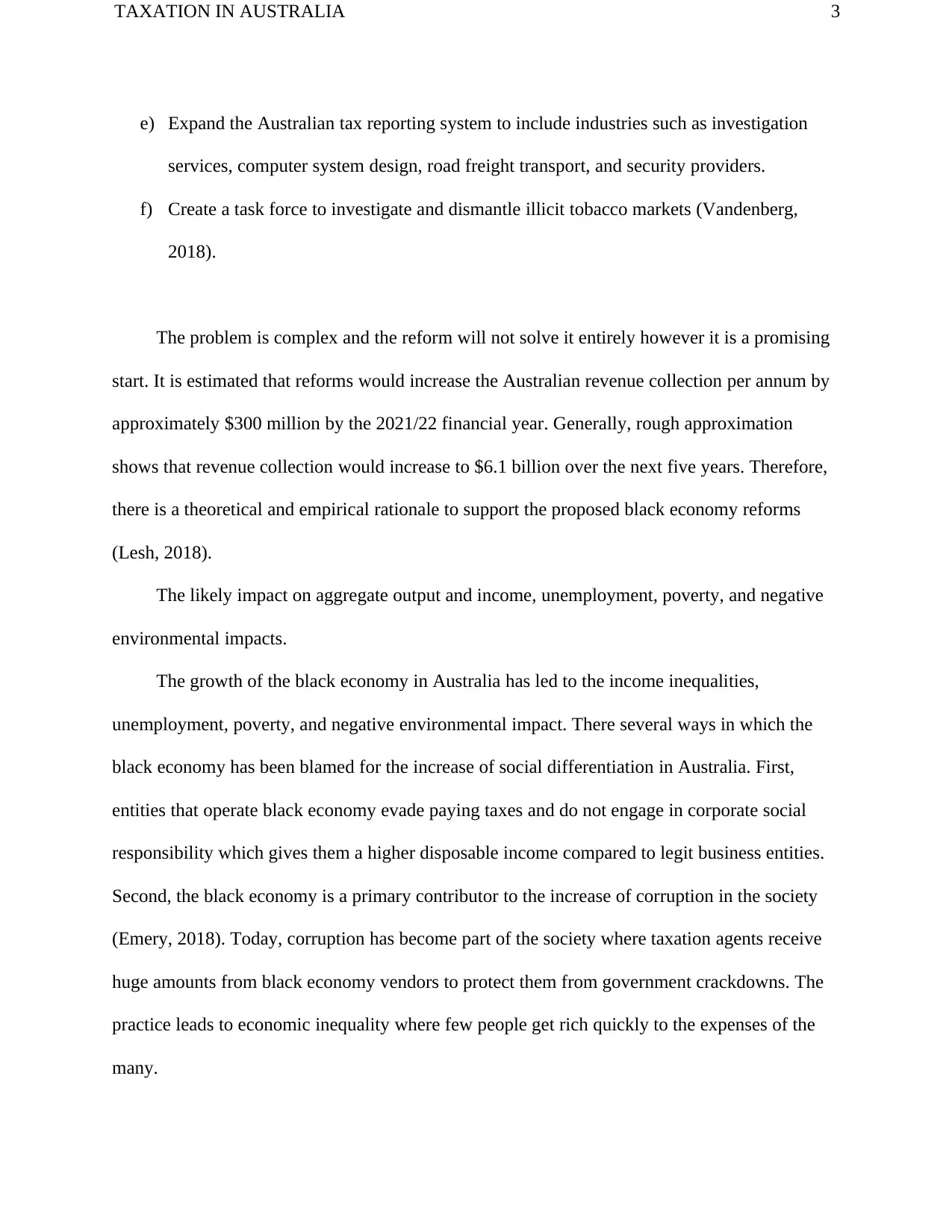
TAXATION IN AUSTRALIA 3
e) Expand the Australian tax reporting system to include industries such as investigation
services, computer system design, road freight transport, and security providers.
f) Create a task force to investigate and dismantle illicit tobacco markets (Vandenberg,
2018).
The problem is complex and the reform will not solve it entirely however it is a promising
start. It is estimated that reforms would increase the Australian revenue collection per annum by
approximately $300 million by the 2021/22 financial year. Generally, rough approximation
shows that revenue collection would increase to $6.1 billion over the next five years. Therefore,
there is a theoretical and empirical rationale to support the proposed black economy reforms
(Lesh, 2018).
The likely impact on aggregate output and income, unemployment, poverty, and negative
environmental impacts.
The growth of the black economy in Australia has led to the income inequalities,
unemployment, poverty, and negative environmental impact. There several ways in which the
black economy has been blamed for the increase of social differentiation in Australia. First,
entities that operate black economy evade paying taxes and do not engage in corporate social
responsibility which gives them a higher disposable income compared to legit business entities.
Second, the black economy is a primary contributor to the increase of corruption in the society
(Emery, 2018). Today, corruption has become part of the society where taxation agents receive
huge amounts from black economy vendors to protect them from government crackdowns. The
practice leads to economic inequality where few people get rich quickly to the expenses of the
many.
e) Expand the Australian tax reporting system to include industries such as investigation
services, computer system design, road freight transport, and security providers.
f) Create a task force to investigate and dismantle illicit tobacco markets (Vandenberg,
2018).
The problem is complex and the reform will not solve it entirely however it is a promising
start. It is estimated that reforms would increase the Australian revenue collection per annum by
approximately $300 million by the 2021/22 financial year. Generally, rough approximation
shows that revenue collection would increase to $6.1 billion over the next five years. Therefore,
there is a theoretical and empirical rationale to support the proposed black economy reforms
(Lesh, 2018).
The likely impact on aggregate output and income, unemployment, poverty, and negative
environmental impacts.
The growth of the black economy in Australia has led to the income inequalities,
unemployment, poverty, and negative environmental impact. There several ways in which the
black economy has been blamed for the increase of social differentiation in Australia. First,
entities that operate black economy evade paying taxes and do not engage in corporate social
responsibility which gives them a higher disposable income compared to legit business entities.
Second, the black economy is a primary contributor to the increase of corruption in the society
(Emery, 2018). Today, corruption has become part of the society where taxation agents receive
huge amounts from black economy vendors to protect them from government crackdowns. The
practice leads to economic inequality where few people get rich quickly to the expenses of the
many.
⊘ This is a preview!⊘
Do you want full access?
Subscribe today to unlock all pages.

Trusted by 1+ million students worldwide
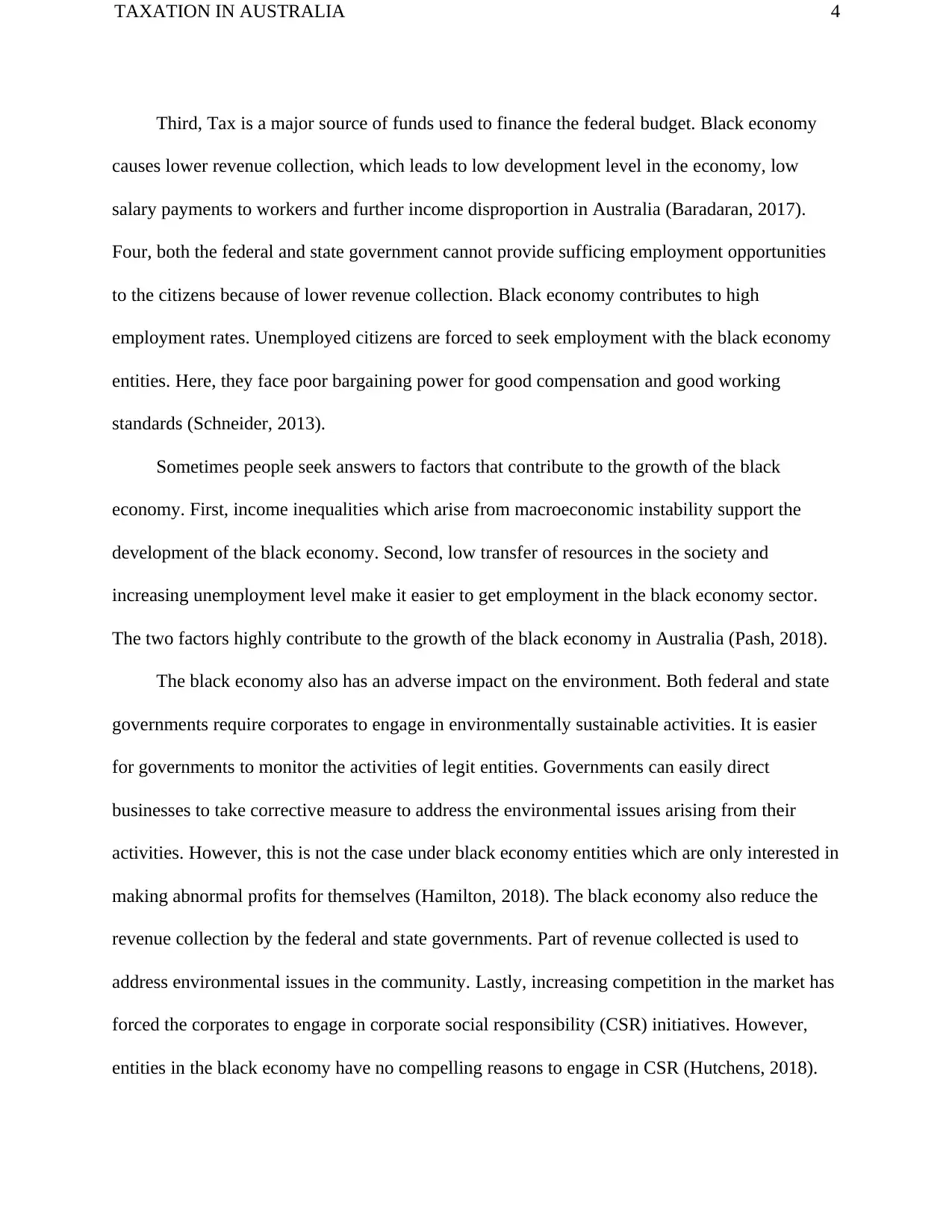
TAXATION IN AUSTRALIA 4
Third, Tax is a major source of funds used to finance the federal budget. Black economy
causes lower revenue collection, which leads to low development level in the economy, low
salary payments to workers and further income disproportion in Australia (Baradaran, 2017).
Four, both the federal and state government cannot provide sufficing employment opportunities
to the citizens because of lower revenue collection. Black economy contributes to high
employment rates. Unemployed citizens are forced to seek employment with the black economy
entities. Here, they face poor bargaining power for good compensation and good working
standards (Schneider, 2013).
Sometimes people seek answers to factors that contribute to the growth of the black
economy. First, income inequalities which arise from macroeconomic instability support the
development of the black economy. Second, low transfer of resources in the society and
increasing unemployment level make it easier to get employment in the black economy sector.
The two factors highly contribute to the growth of the black economy in Australia (Pash, 2018).
The black economy also has an adverse impact on the environment. Both federal and state
governments require corporates to engage in environmentally sustainable activities. It is easier
for governments to monitor the activities of legit entities. Governments can easily direct
businesses to take corrective measure to address the environmental issues arising from their
activities. However, this is not the case under black economy entities which are only interested in
making abnormal profits for themselves (Hamilton, 2018). The black economy also reduce the
revenue collection by the federal and state governments. Part of revenue collected is used to
address environmental issues in the community. Lastly, increasing competition in the market has
forced the corporates to engage in corporate social responsibility (CSR) initiatives. However,
entities in the black economy have no compelling reasons to engage in CSR (Hutchens, 2018).
Third, Tax is a major source of funds used to finance the federal budget. Black economy
causes lower revenue collection, which leads to low development level in the economy, low
salary payments to workers and further income disproportion in Australia (Baradaran, 2017).
Four, both the federal and state government cannot provide sufficing employment opportunities
to the citizens because of lower revenue collection. Black economy contributes to high
employment rates. Unemployed citizens are forced to seek employment with the black economy
entities. Here, they face poor bargaining power for good compensation and good working
standards (Schneider, 2013).
Sometimes people seek answers to factors that contribute to the growth of the black
economy. First, income inequalities which arise from macroeconomic instability support the
development of the black economy. Second, low transfer of resources in the society and
increasing unemployment level make it easier to get employment in the black economy sector.
The two factors highly contribute to the growth of the black economy in Australia (Pash, 2018).
The black economy also has an adverse impact on the environment. Both federal and state
governments require corporates to engage in environmentally sustainable activities. It is easier
for governments to monitor the activities of legit entities. Governments can easily direct
businesses to take corrective measure to address the environmental issues arising from their
activities. However, this is not the case under black economy entities which are only interested in
making abnormal profits for themselves (Hamilton, 2018). The black economy also reduce the
revenue collection by the federal and state governments. Part of revenue collected is used to
address environmental issues in the community. Lastly, increasing competition in the market has
forced the corporates to engage in corporate social responsibility (CSR) initiatives. However,
entities in the black economy have no compelling reasons to engage in CSR (Hutchens, 2018).
Paraphrase This Document
Need a fresh take? Get an instant paraphrase of this document with our AI Paraphraser
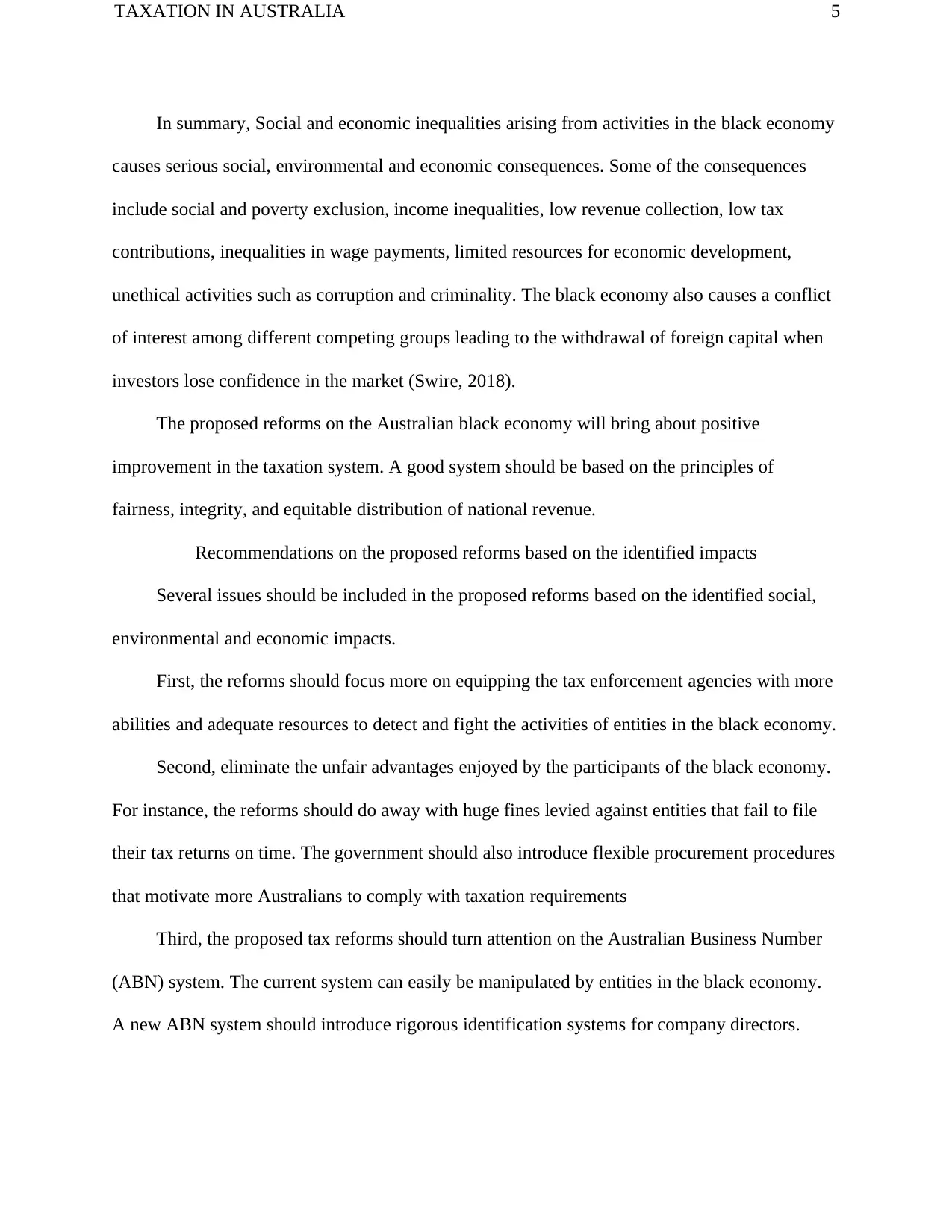
TAXATION IN AUSTRALIA 5
In summary, Social and economic inequalities arising from activities in the black economy
causes serious social, environmental and economic consequences. Some of the consequences
include social and poverty exclusion, income inequalities, low revenue collection, low tax
contributions, inequalities in wage payments, limited resources for economic development,
unethical activities such as corruption and criminality. The black economy also causes a conflict
of interest among different competing groups leading to the withdrawal of foreign capital when
investors lose confidence in the market (Swire, 2018).
The proposed reforms on the Australian black economy will bring about positive
improvement in the taxation system. A good system should be based on the principles of
fairness, integrity, and equitable distribution of national revenue.
Recommendations on the proposed reforms based on the identified impacts
Several issues should be included in the proposed reforms based on the identified social,
environmental and economic impacts.
First, the reforms should focus more on equipping the tax enforcement agencies with more
abilities and adequate resources to detect and fight the activities of entities in the black economy.
Second, eliminate the unfair advantages enjoyed by the participants of the black economy.
For instance, the reforms should do away with huge fines levied against entities that fail to file
their tax returns on time. The government should also introduce flexible procurement procedures
that motivate more Australians to comply with taxation requirements
Third, the proposed tax reforms should turn attention on the Australian Business Number
(ABN) system. The current system can easily be manipulated by entities in the black economy.
A new ABN system should introduce rigorous identification systems for company directors.
In summary, Social and economic inequalities arising from activities in the black economy
causes serious social, environmental and economic consequences. Some of the consequences
include social and poverty exclusion, income inequalities, low revenue collection, low tax
contributions, inequalities in wage payments, limited resources for economic development,
unethical activities such as corruption and criminality. The black economy also causes a conflict
of interest among different competing groups leading to the withdrawal of foreign capital when
investors lose confidence in the market (Swire, 2018).
The proposed reforms on the Australian black economy will bring about positive
improvement in the taxation system. A good system should be based on the principles of
fairness, integrity, and equitable distribution of national revenue.
Recommendations on the proposed reforms based on the identified impacts
Several issues should be included in the proposed reforms based on the identified social,
environmental and economic impacts.
First, the reforms should focus more on equipping the tax enforcement agencies with more
abilities and adequate resources to detect and fight the activities of entities in the black economy.
Second, eliminate the unfair advantages enjoyed by the participants of the black economy.
For instance, the reforms should do away with huge fines levied against entities that fail to file
their tax returns on time. The government should also introduce flexible procurement procedures
that motivate more Australians to comply with taxation requirements
Third, the proposed tax reforms should turn attention on the Australian Business Number
(ABN) system. The current system can easily be manipulated by entities in the black economy.
A new ABN system should introduce rigorous identification systems for company directors.
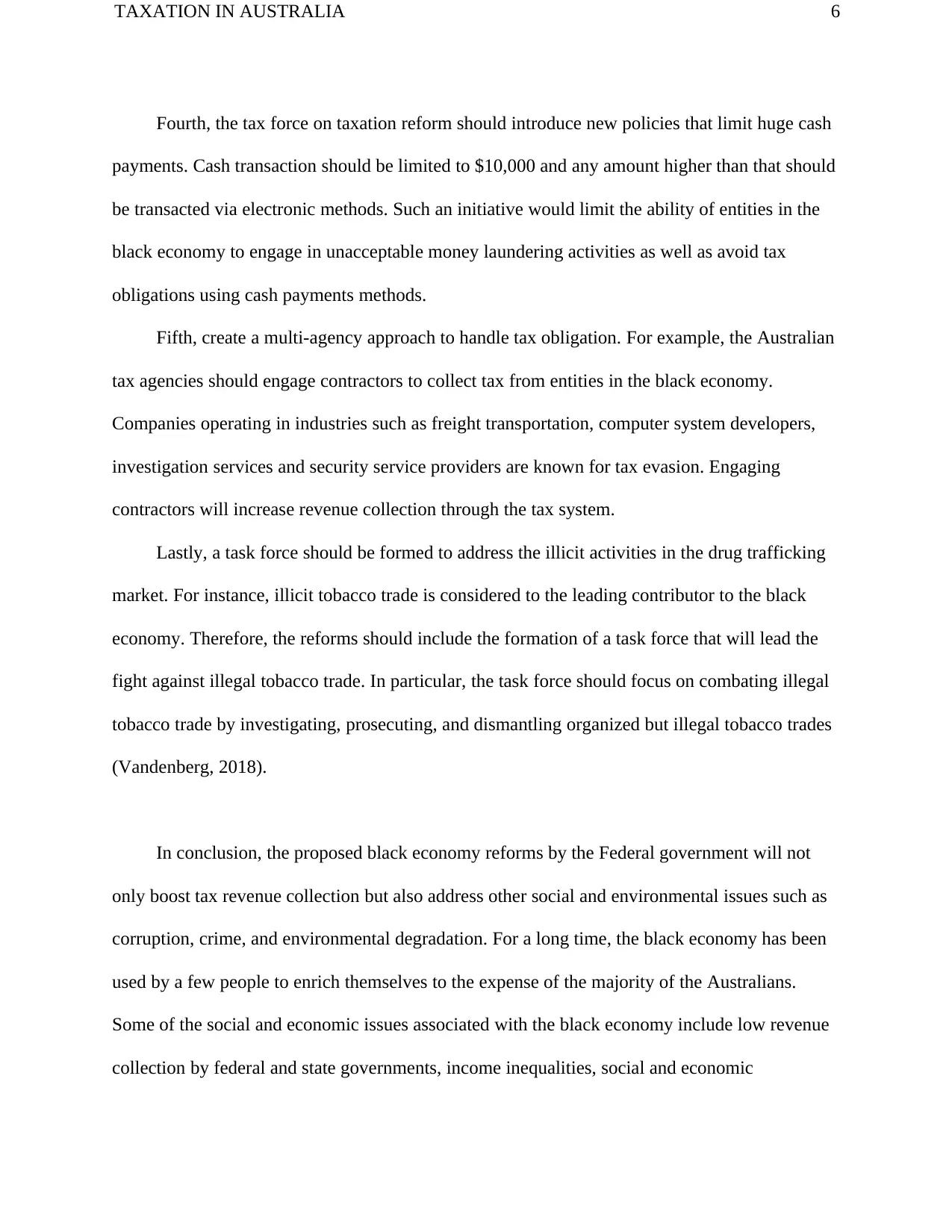
TAXATION IN AUSTRALIA 6
Fourth, the tax force on taxation reform should introduce new policies that limit huge cash
payments. Cash transaction should be limited to $10,000 and any amount higher than that should
be transacted via electronic methods. Such an initiative would limit the ability of entities in the
black economy to engage in unacceptable money laundering activities as well as avoid tax
obligations using cash payments methods.
Fifth, create a multi-agency approach to handle tax obligation. For example, the Australian
tax agencies should engage contractors to collect tax from entities in the black economy.
Companies operating in industries such as freight transportation, computer system developers,
investigation services and security service providers are known for tax evasion. Engaging
contractors will increase revenue collection through the tax system.
Lastly, a task force should be formed to address the illicit activities in the drug trafficking
market. For instance, illicit tobacco trade is considered to the leading contributor to the black
economy. Therefore, the reforms should include the formation of a task force that will lead the
fight against illegal tobacco trade. In particular, the task force should focus on combating illegal
tobacco trade by investigating, prosecuting, and dismantling organized but illegal tobacco trades
(Vandenberg, 2018).
In conclusion, the proposed black economy reforms by the Federal government will not
only boost tax revenue collection but also address other social and environmental issues such as
corruption, crime, and environmental degradation. For a long time, the black economy has been
used by a few people to enrich themselves to the expense of the majority of the Australians.
Some of the social and economic issues associated with the black economy include low revenue
collection by federal and state governments, income inequalities, social and economic
Fourth, the tax force on taxation reform should introduce new policies that limit huge cash
payments. Cash transaction should be limited to $10,000 and any amount higher than that should
be transacted via electronic methods. Such an initiative would limit the ability of entities in the
black economy to engage in unacceptable money laundering activities as well as avoid tax
obligations using cash payments methods.
Fifth, create a multi-agency approach to handle tax obligation. For example, the Australian
tax agencies should engage contractors to collect tax from entities in the black economy.
Companies operating in industries such as freight transportation, computer system developers,
investigation services and security service providers are known for tax evasion. Engaging
contractors will increase revenue collection through the tax system.
Lastly, a task force should be formed to address the illicit activities in the drug trafficking
market. For instance, illicit tobacco trade is considered to the leading contributor to the black
economy. Therefore, the reforms should include the formation of a task force that will lead the
fight against illegal tobacco trade. In particular, the task force should focus on combating illegal
tobacco trade by investigating, prosecuting, and dismantling organized but illegal tobacco trades
(Vandenberg, 2018).
In conclusion, the proposed black economy reforms by the Federal government will not
only boost tax revenue collection but also address other social and environmental issues such as
corruption, crime, and environmental degradation. For a long time, the black economy has been
used by a few people to enrich themselves to the expense of the majority of the Australians.
Some of the social and economic issues associated with the black economy include low revenue
collection by federal and state governments, income inequalities, social and economic
⊘ This is a preview!⊘
Do you want full access?
Subscribe today to unlock all pages.

Trusted by 1+ million students worldwide
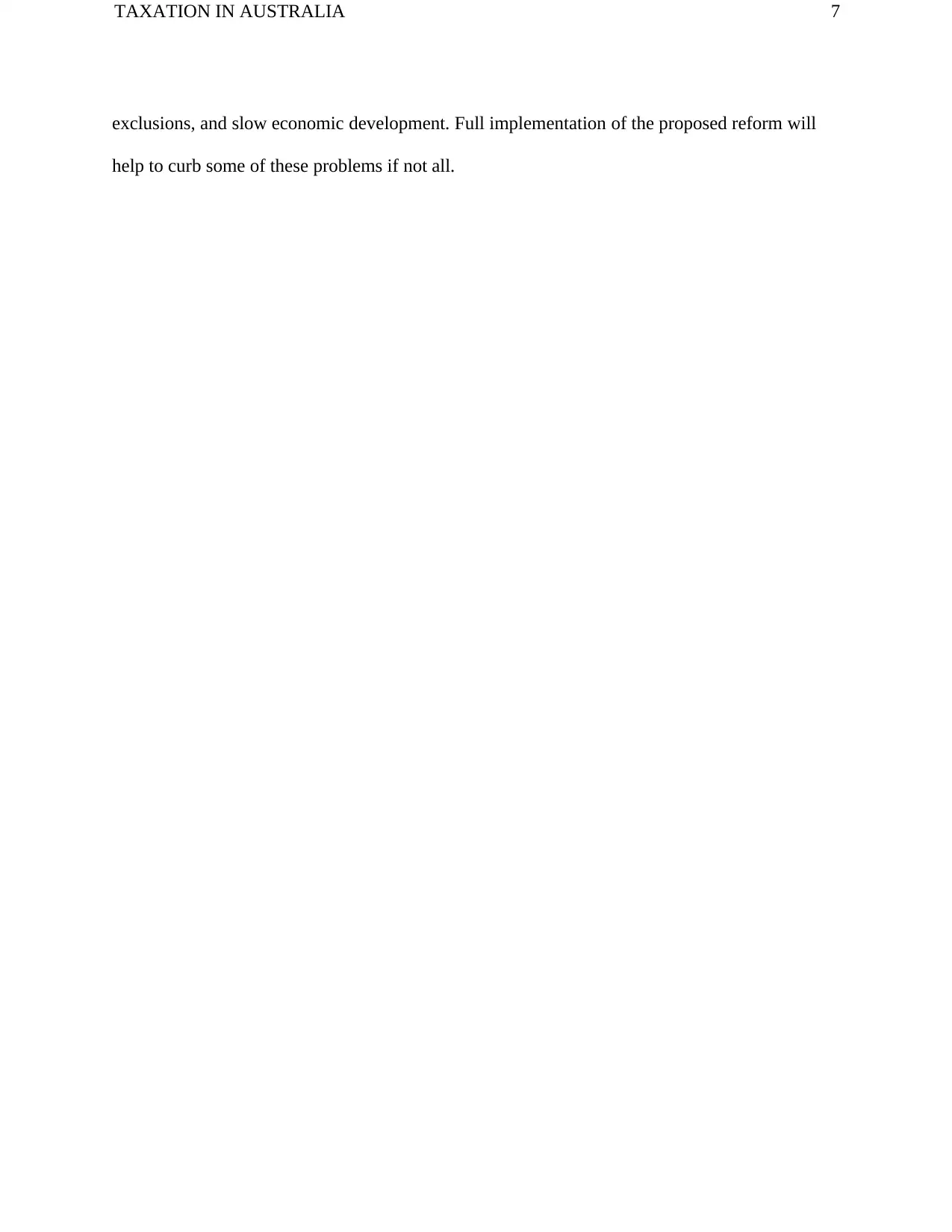
TAXATION IN AUSTRALIA 7
exclusions, and slow economic development. Full implementation of the proposed reform will
help to curb some of these problems if not all.
exclusions, and slow economic development. Full implementation of the proposed reform will
help to curb some of these problems if not all.
Paraphrase This Document
Need a fresh take? Get an instant paraphrase of this document with our AI Paraphraser
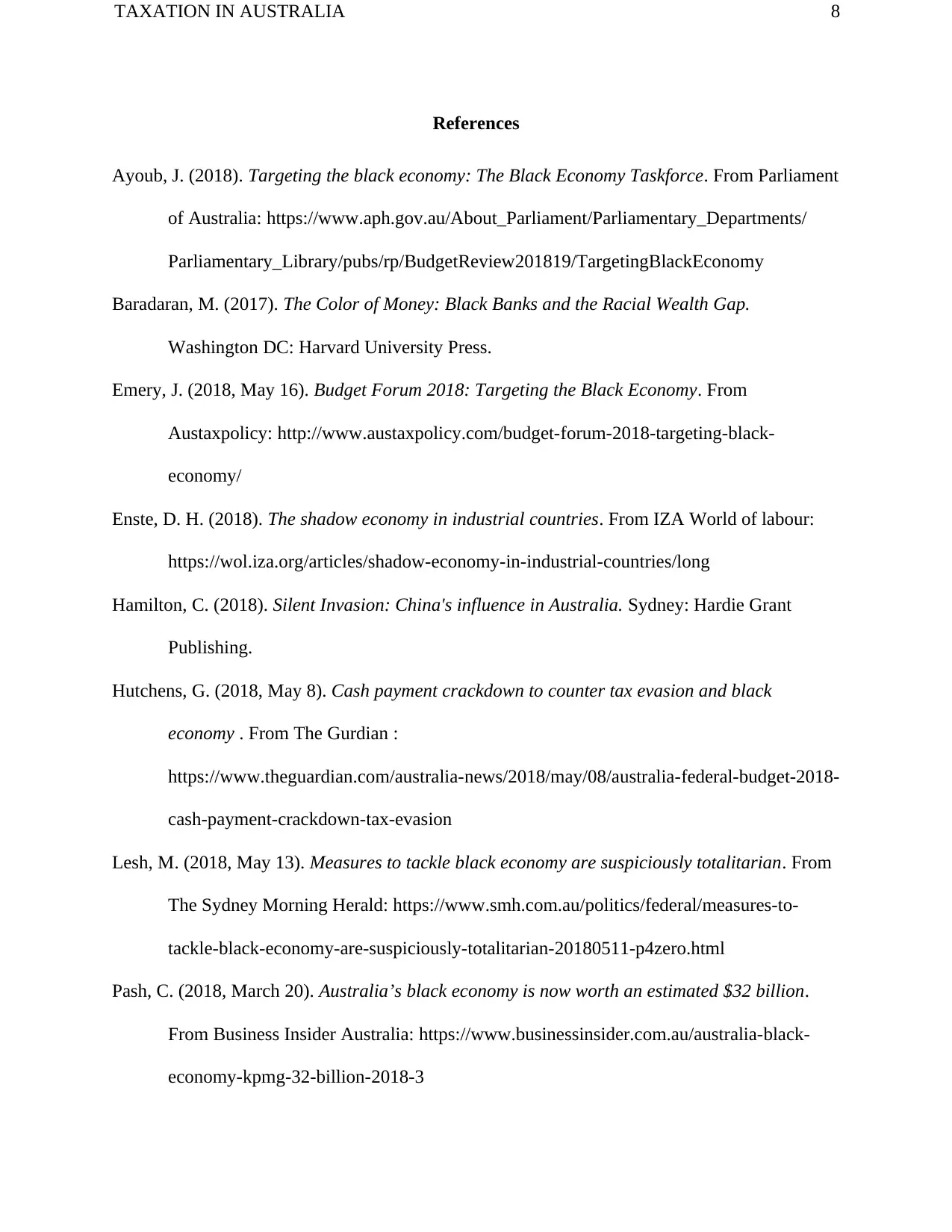
TAXATION IN AUSTRALIA 8
References
Ayoub, J. (2018). Targeting the black economy: The Black Economy Taskforce. From Parliament
of Australia: https://www.aph.gov.au/About_Parliament/Parliamentary_Departments/
Parliamentary_Library/pubs/rp/BudgetReview201819/TargetingBlackEconomy
Baradaran, M. (2017). The Color of Money: Black Banks and the Racial Wealth Gap.
Washington DC: Harvard University Press.
Emery, J. (2018, May 16). Budget Forum 2018: Targeting the Black Economy. From
Austaxpolicy: http://www.austaxpolicy.com/budget-forum-2018-targeting-black-
economy/
Enste, D. H. (2018). The shadow economy in industrial countries. From IZA World of labour:
https://wol.iza.org/articles/shadow-economy-in-industrial-countries/long
Hamilton, C. (2018). Silent Invasion: China's influence in Australia. Sydney: Hardie Grant
Publishing.
Hutchens, G. (2018, May 8). Cash payment crackdown to counter tax evasion and black
economy . From The Gurdian :
https://www.theguardian.com/australia-news/2018/may/08/australia-federal-budget-2018-
cash-payment-crackdown-tax-evasion
Lesh, M. (2018, May 13). Measures to tackle black economy are suspiciously totalitarian. From
The Sydney Morning Herald: https://www.smh.com.au/politics/federal/measures-to-
tackle-black-economy-are-suspiciously-totalitarian-20180511-p4zero.html
Pash, C. (2018, March 20). Australia’s black economy is now worth an estimated $32 billion.
From Business Insider Australia: https://www.businessinsider.com.au/australia-black-
economy-kpmg-32-billion-2018-3
References
Ayoub, J. (2018). Targeting the black economy: The Black Economy Taskforce. From Parliament
of Australia: https://www.aph.gov.au/About_Parliament/Parliamentary_Departments/
Parliamentary_Library/pubs/rp/BudgetReview201819/TargetingBlackEconomy
Baradaran, M. (2017). The Color of Money: Black Banks and the Racial Wealth Gap.
Washington DC: Harvard University Press.
Emery, J. (2018, May 16). Budget Forum 2018: Targeting the Black Economy. From
Austaxpolicy: http://www.austaxpolicy.com/budget-forum-2018-targeting-black-
economy/
Enste, D. H. (2018). The shadow economy in industrial countries. From IZA World of labour:
https://wol.iza.org/articles/shadow-economy-in-industrial-countries/long
Hamilton, C. (2018). Silent Invasion: China's influence in Australia. Sydney: Hardie Grant
Publishing.
Hutchens, G. (2018, May 8). Cash payment crackdown to counter tax evasion and black
economy . From The Gurdian :
https://www.theguardian.com/australia-news/2018/may/08/australia-federal-budget-2018-
cash-payment-crackdown-tax-evasion
Lesh, M. (2018, May 13). Measures to tackle black economy are suspiciously totalitarian. From
The Sydney Morning Herald: https://www.smh.com.au/politics/federal/measures-to-
tackle-black-economy-are-suspiciously-totalitarian-20180511-p4zero.html
Pash, C. (2018, March 20). Australia’s black economy is now worth an estimated $32 billion.
From Business Insider Australia: https://www.businessinsider.com.au/australia-black-
economy-kpmg-32-billion-2018-3
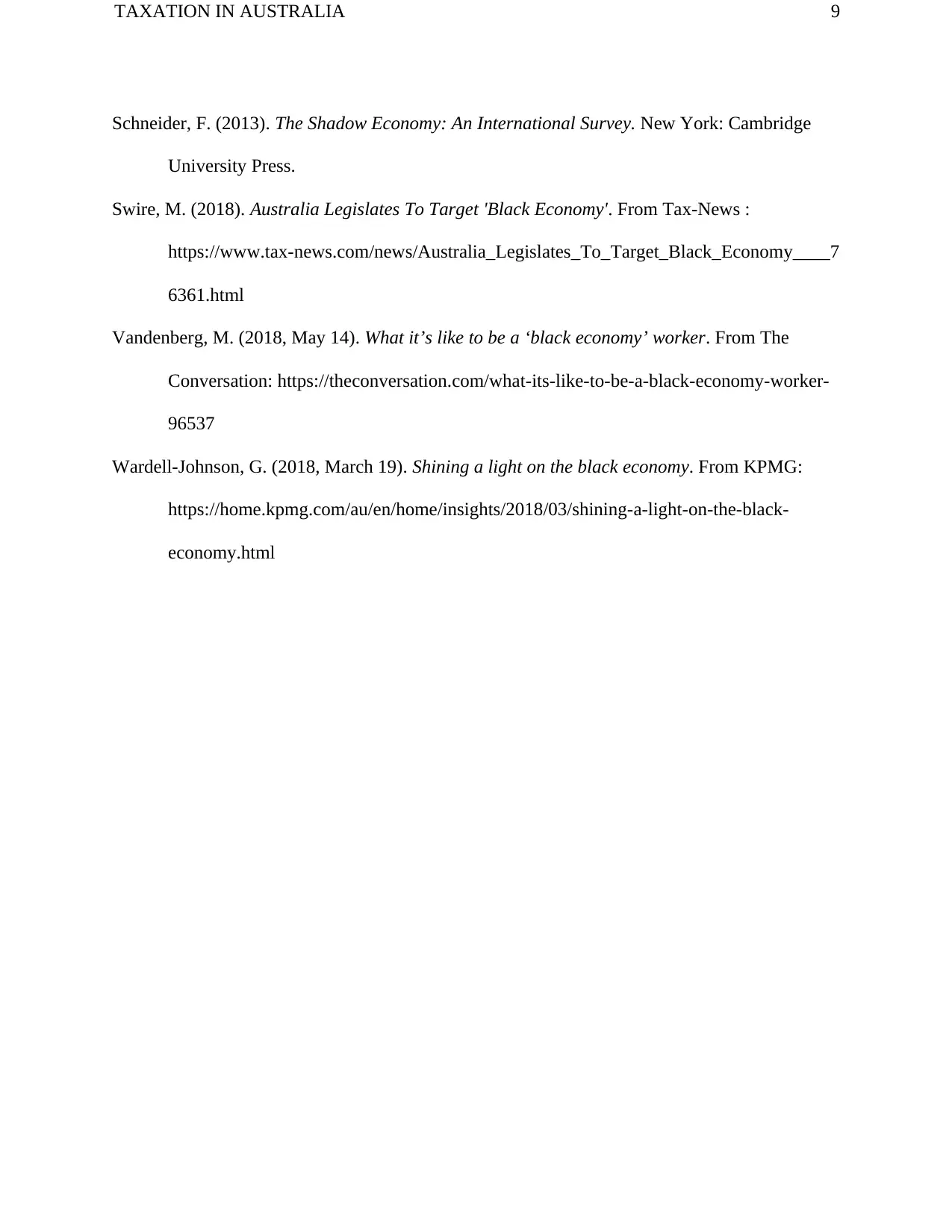
TAXATION IN AUSTRALIA 9
Schneider, F. (2013). The Shadow Economy: An International Survey. New York: Cambridge
University Press.
Swire, M. (2018). Australia Legislates To Target 'Black Economy'. From Tax-News :
https://www.tax-news.com/news/Australia_Legislates_To_Target_Black_Economy____7
6361.html
Vandenberg, M. (2018, May 14). What it’s like to be a ‘black economy’ worker. From The
Conversation: https://theconversation.com/what-its-like-to-be-a-black-economy-worker-
96537
Wardell-Johnson, G. (2018, March 19). Shining a light on the black economy. From KPMG:
https://home.kpmg.com/au/en/home/insights/2018/03/shining-a-light-on-the-black-
economy.html
Schneider, F. (2013). The Shadow Economy: An International Survey. New York: Cambridge
University Press.
Swire, M. (2018). Australia Legislates To Target 'Black Economy'. From Tax-News :
https://www.tax-news.com/news/Australia_Legislates_To_Target_Black_Economy____7
6361.html
Vandenberg, M. (2018, May 14). What it’s like to be a ‘black economy’ worker. From The
Conversation: https://theconversation.com/what-its-like-to-be-a-black-economy-worker-
96537
Wardell-Johnson, G. (2018, March 19). Shining a light on the black economy. From KPMG:
https://home.kpmg.com/au/en/home/insights/2018/03/shining-a-light-on-the-black-
economy.html
⊘ This is a preview!⊘
Do you want full access?
Subscribe today to unlock all pages.

Trusted by 1+ million students worldwide
1 out of 9
Related Documents
Your All-in-One AI-Powered Toolkit for Academic Success.
+13062052269
info@desklib.com
Available 24*7 on WhatsApp / Email
![[object Object]](/_next/static/media/star-bottom.7253800d.svg)
Unlock your academic potential
Copyright © 2020–2026 A2Z Services. All Rights Reserved. Developed and managed by ZUCOL.





